Deep Breath
Sunday, 24 August 2014 - Reviewed by Chuck Foster
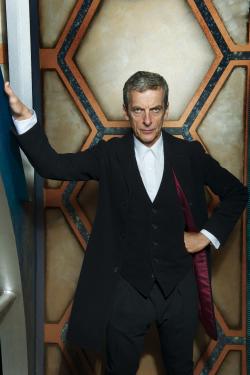 Series openers have always got a lot to contend with; they have to balance between welcoming back older viewers who are expecting more of what they watched the show previously for, and also welcoming new viewers to the fold who may not know what the show is about. With Doctor Who that can be even harder, with nigh on ten years of new adventures continuing a show now literally in its golden years, under unabated media scrutiny and audience expectation. Then, throw a new Doctor into the mix ...
Series openers have always got a lot to contend with; they have to balance between welcoming back older viewers who are expecting more of what they watched the show previously for, and also welcoming new viewers to the fold who may not know what the show is about. With Doctor Who that can be even harder, with nigh on ten years of new adventures continuing a show now literally in its golden years, under unabated media scrutiny and audience expectation. Then, throw a new Doctor into the mix ...Unlike the arrival of Christopher Eccleston's version, which the production team took great care to identify as a continuation of the 20th Century series in naming him the - ahem - ninth incarnation, at Christmas The Time of the Doctor actually pulled the reset switch in 'killing' off the Doctor as he reached the end of his final regeneration ... and then like a phoenix rising from the ashes brought forth a renewed Doctor as he is granted a whole new life cycle by the Time Lords. In doing so, it also gave the production team carte-blanche to radically change the Doctor's personality, unburdened by his previous forms, and take the show in a new direction. But would they take that chance to potentially alienate an audience?
Well, of course not. After the disaster that was the sixth Doctor's introduction back in 1984, such a radical alteration was never going to be on the cards. However, as demonstrated in last night's Deep Breath, the character can certainly be massaged into a much more ambigious personality who the audience themselves are unsure of, let alone those on screen. We have the moment where the Doctor apparently abandons Clara to the "Half Face Man" ("no point in catching us both"), and then later his look from the restaurant-turned-balloon after the aforementioned robot falls to its (his?) impalation on the top of St Stephens Tower (this is a Victorian story, pedants (grin)) leaves us in total doubt as to whether he pushed or not. However, considering the way the (original) first Doctor behaved over his first adventures we aren't exactly in virgin territory, and he is essentially still the same being that we've known over the last 2000+ years - as hammered home rather unsubtly during the course of the story by Vastra and the Doctor himself.
Pulling it off is a skill, both in performance and direction, and as the new Doctor Peter Capaldi easily succeeds, ably introduced by Ben Wheatley, whose horror credentials certainly are in play in a number of scenes in the latter half of the story. However, it is the latter half where things properly kick off, with the earlier scenes are perhaps being a little too lengthy and slowing the story down somewhat. This is of course one of the problems with exposition, and as I mentioned when starting this review, there's a fair bit to expose! Writer Steven Moffat allowing some 80 minutes for the plot threads to 'breathe' (sorry!) was a good move, but perhaps it could have been shaved down a little just to make it a little pacier.
Anyway, to the story itself!
Prehistoric creatures have come a long way with Walking with Dinosaurs, and our inadvertent visitor to Victorian London was a remarkable creation (please give Invasion of the Dinosaurs a special edition...). Of course real science might not be in play here (see the New Scientist review) but it is catered for in the story universe (thanks, Vastra). It's a shame that it was a macguffin rather than anything more important in the story, but strangely you do feel empathy for it, courtesy of the Doctor (amazing how the TARDIS selectively translates language for its prefered inhabitants) and its sad demise does contribute to moving the story along - though the indication that the robots have been around since the creature's own era in time is an area of plot that, like the ship's location underground, shouldn't be dug into too deeply! Come to think of it, why bring back clockwork droids at all, their inclusion felt a bit like the Autons back in Rose, feeling more of a "historical" enemy's return for its own sake rather than serving the narrative. Mind you, Wheatley skillfully creates some genuinely disturbing moments that eclipse their previous appearance in The Girl in the Fireplace, so I'm not going to worry about that so much!
Jenna Coleman, Neve McIntosh, Catrin Stewart and Dan Starkey continue to perform strongly, with the latter's portrayal one of the highlights of the episode. The fan in me frowns a bit at how Moffat has seemingly turned the Sontarans into the Ferengi of Doctor Who, but he does get some of the best lines and Starkey never quites takes his performance into farce, so I end up looking forward to his scenes. ("The Doctor is still missing, but he will always come looking for his box. By bringing it here, he will be lured from the dangers of London into this place of safety and we will melt him with acid ... We will not melt him with acid.", followed by his 'special' delivery of the Times to Clara win the prize!). Peter Ferdinando was especially chilling with his portrayal of the "Half Face Man", and again the effects did not let down in animating his clockwork half. Whether we've actually seen the last of him remains to be seen after that ending, and like with Rose in Partners in Crime, the appearance of Michelle Gomez's Missy was delightfully unexpected - I really hope the Gatekeeper of the Nethersphere isn't going to turn out to be the Rani or a female Master as quite a few have speculated and that she is a new original character for us to enjoy in the same way as Madame Kovarian in the 2011 series.
As for that other cameo, I did know it was coming from filming reports but fortunately had forgotten about it until the phone rang. Watching it live evoked the same kind of nostalgic emotion that the final scenes of The End of Time did, though in hindsight I'm not so sure it really served the story so well - it might have been nicer as one of those online/red button extras to enjoy separately rather than in the story proper. Still, its purpose was to remind us (again) that we are watching a continuation of a fifty year tradition!
I can't finish without mentioning the new titles of course. The graphics looked great, and the reflection of the 'clock' theme within the opening bars of the theme was a nice touch (presumably weekly and not just for this clockwork-themed episode), but the main theme sounded very tinny, at least in a non-5.1 environment - I almost had a "Delaware" moment listening to it again! It doesn't seem to quite provide the majesty that I've come to expect from the series theme tune, but I suppose it'll grow on me in time!
All-in-all, Capaldi's debut story was enjoyable, if perhaps a little longer than it needed to be (though it certainly wasn't a clock-watching episode). There was nothing that made me tut at the screen either, so that is always a good sign. It will be interesting to see if this Doctor continues to be 'alien' or becomes more 'human' as with the first Doctor over the next eleven weeks.
Finally, Capaldi himself delivered all my expectations of him as the Doctor, so I'm looking forward to the next 7+ years of him in the role (grin).
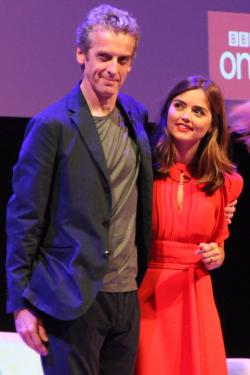
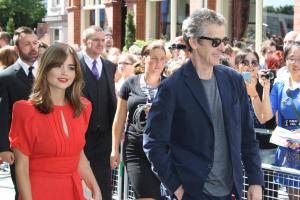
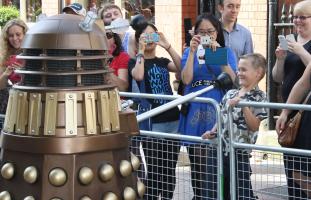
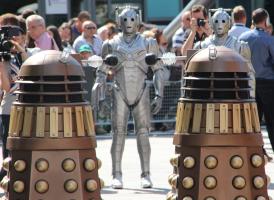



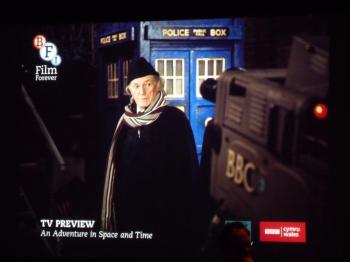 There are many things in life, in art and in drama that can provoke emotion. It’s probably safe to say that a car’s tax disc is not usually one of them.
There are many things in life, in art and in drama that can provoke emotion. It’s probably safe to say that a car’s tax disc is not usually one of them.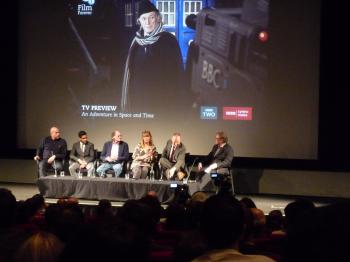 But it’s a piece full of nice touches, none more so than at the end. Before the screening started, we were kindly and rightly asked by the BFI’s Television Programmer Marcus Prince not to share any spoiler details of the drama, and I do not intend to do so here. Indeed, I really, truly hope you don’t see any details about the ending before you see the programme, and are able to come to it fresh – you’ll find it so much more rewarding if you do. I shall simply say that it did not end in the way I had expected, and the way in which it did finish hit me so hard that the tears did indeed begin to flow.
But it’s a piece full of nice touches, none more so than at the end. Before the screening started, we were kindly and rightly asked by the BFI’s Television Programmer Marcus Prince not to share any spoiler details of the drama, and I do not intend to do so here. Indeed, I really, truly hope you don’t see any details about the ending before you see the programme, and are able to come to it fresh – you’ll find it so much more rewarding if you do. I shall simply say that it did not end in the way I had expected, and the way in which it did finish hit me so hard that the tears did indeed begin to flow.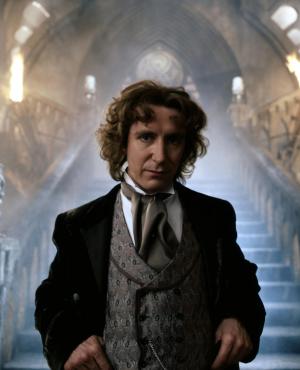 For the previous screenings in the British Film Institute’s monthly Doctor Who 50th anniversary events, there has been some degree of choice for the organisation in which story it selects to celebrate the era of each particular Doctor. While it’s true that every era of the show has a small gaggle of stories held up as classics by a large portion of fandom, there have still always been options. Not so, however, for
For the previous screenings in the British Film Institute’s monthly Doctor Who 50th anniversary events, there has been some degree of choice for the organisation in which story it selects to celebrate the era of each particular Doctor. While it’s true that every era of the show has a small gaggle of stories held up as classics by a large portion of fandom, there have still always been options. Not so, however, for 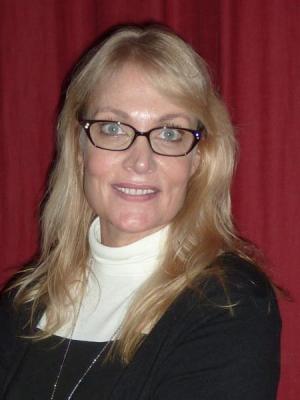 Indeed, for a production that was being pulled in so many different directions – by the BBC, by the Fox Network who were broadcasting it in the US, by Universal who were producing it, by
Indeed, for a production that was being pulled in so many different directions – by the BBC, by the Fox Network who were broadcasting it in the US, by Universal who were producing it, by 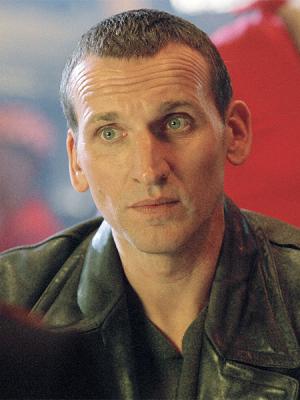 When the British Film Institute announced their series of monthly screenings throughout 2013 to celebrate the 50th anniversary of Doctor Who, I thought that they sounded like a nice idea, but I wasn’t particularly fussed about attending any of them myself. I hadn’t been to any Doctor Who events for a very long time, and thought that they weren’t necessarily my sort of thing.
When the British Film Institute announced their series of monthly screenings throughout 2013 to celebrate the 50th anniversary of Doctor Who, I thought that they sounded like a nice idea, but I wasn’t particularly fussed about attending any of them myself. I hadn’t been to any Doctor Who events for a very long time, and thought that they weren’t necessarily my sort of thing.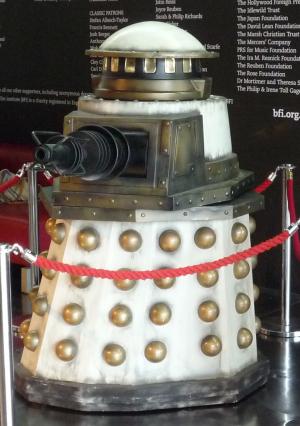 I love
I love  I'd never actually seen an episode of Doctor Who shown on a big screen before, and wasn't sure how well 4:3-framed 625-line video material would hold up under such scrutiny. In fact, it looked very good indeed, perfectly sharp and at such size I found myself noticing little details I hadn't spotted before, such as the graffiti figure on the school gate next to The Girl, as she watches the Doctor and Ace in episode one.
I'd never actually seen an episode of Doctor Who shown on a big screen before, and wasn't sure how well 4:3-framed 625-line video material would hold up under such scrutiny. In fact, it looked very good indeed, perfectly sharp and at such size I found myself noticing little details I hadn't spotted before, such as the graffiti figure on the school gate next to The Girl, as she watches the Doctor and Ace in episode one. There were also interesting little chats with effects designer
There were also interesting little chats with effects designer 






